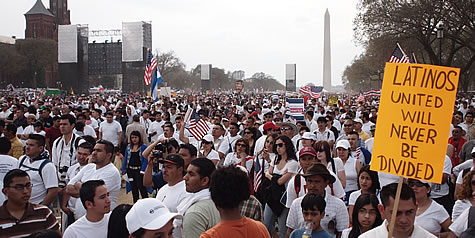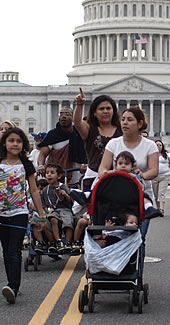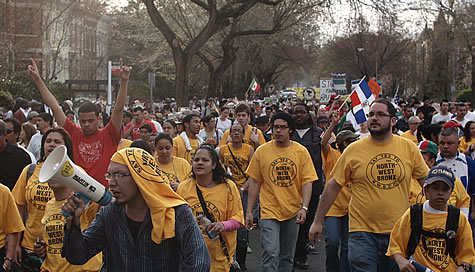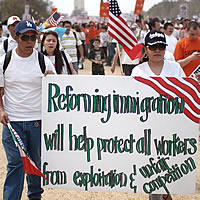Posted March 25, 2010
Around 200,000 immigrants, workers, and family members packed the National Mall on Sunday, March 21 to demand immigration reform. At least doubling organizers’ goal, the mass of people, which recalled huge rallies and marches across the country in 2006, was one of the largest demonstrations since Obama’s inauguration. We held signs and chanted: Obama, no dejes la reforma pa’ mañana – Obama, don’t put off reform until tomorrow.

The crowd also provided a sobering visual for the human impact of Obama’s failure to deliver on promises of immigration reform within his first year. Over the past 12 months, at least 387,000 migrants – nearly twice this surging sea of faces in Washington – have been deported.
Many wore t-shirts or held banners announcing the particular town, family, community, union, or church they’d arrived with: housing organizations, GLBT immigrants, students, workers centers, farmworkers, from all corners of the country. Most were Latino, but there were others: Senagalese, Korean, Polish, and other nationalities were present as contingents. SEIU and especially the Laborers union turned out large delegations of rank-and file workers. A man from a small town in Nebraska, through tears, told fellow marchers how alone he often feels – and how powerful he felt that morning, united with thousands of other immigrants.
 While the many participants wore white shirts and held United States flags, others held flags of their home countries: Mexico, Bolivia, Honduras, even the flag of the left-wing ruling party of El Salvador, the FMLN. Many announced their bi-national identity by wrapping both flags together. One call-and-response chant slipped seamlessly over the border: Illinois? Presente! North Carolina? Presente! New York? Presente! Oaxaca? Presente! Guanajuato? Presente! Florida?… Another popular slogan expressed the mood: Aqui Estamos, y No Nos Vamos! Y Si nos echan, Nos Regresamos! – We’re here! We’re Not Going Anywhere! And if they throw us out, we’re coming back!”
While the many participants wore white shirts and held United States flags, others held flags of their home countries: Mexico, Bolivia, Honduras, even the flag of the left-wing ruling party of El Salvador, the FMLN. Many announced their bi-national identity by wrapping both flags together. One call-and-response chant slipped seamlessly over the border: Illinois? Presente! North Carolina? Presente! New York? Presente! Oaxaca? Presente! Guanajuato? Presente! Florida?… Another popular slogan expressed the mood: Aqui Estamos, y No Nos Vamos! Y Si nos echan, Nos Regresamos! – We’re here! We’re Not Going Anywhere! And if they throw us out, we’re coming back!”
Perhaps the most important impact of the march was its effect on the thousands of new and young activists, many of whom had never before organized for a large demonstration. In the coming fight, this new generation of leadership will be crucial.
Migration: A question of Human Rights, or National Security?
Tens of millions of immigrants have made a home in cities large and small, in every corner of the country. Around twelve million live every day without documentation, facing the fear of harassment and deportation. There are two, contradictory understandings of this reality. One sees immigration as fundamentally a question of international human and workers’ rights, the second as a issue of “national security.”

But security for whom? Migration is driven by economic conditions. When jobs disappear in one place, people move to find new jobs. This happens within the United States (or any large country) all the time. But add an international border to the mix, and job seekers or other economic refugees become criminals — while corporations face no problem constantly relocating workplaces in search of cheaper labor. Economic policies like NAFTA that have dealt blows to blue collar USA have done the same to Mexican workers. The border doesn’t stop the movement of people, it just makes people from the South have second-class status on the other side. And for workers, “security” comes through not having to compete with each other — by equalizing rights (including language rights) and living standards for all.
Two visions of “Reform” from Above and Below
In its goal of putting immigration reform on the agenda, the March 21 mobilization was a success — despite the lack of attention from english-language media, politicians were clearly paying attention. However, now that it’s on the agenda, the question “What is the agenda, anyway?” has surfaced. As with many large demonstrations, the voices from many in the crowd contrasted with the politician’s speeches from the stage.
Reform Immigration for America, the network that circulated the call to demonstrate, has evolved over the past year as a savvy, top-down campaign closely linked to Democratic congressman from Illinois, Luis Gutierrez. In December Gutierrez announced the so-called “CIR-ASAP” bill (Comprehensive Immigration Reform for America’s Security and Prosperity). The bill mixed some of the main demands of the immigrants rights movement — such as a path to citizenship, an emphasis on family unification, and repeal of 287(g) — with concessions to “national security,” such as the notorious border wall that physically separates the US and Mexico.
Meanwhile, a second piece of proposed legislation emerged from the Senate. Authored by Charles Schumer and Lindsey Graham, it was announced in a Washington Post editorial just before the march. In a recorded address to the rally on Saturday, Obama voiced his support for the bill’s “common sense and effective strategies.” What are they?
Two of four “pillars” in the Schumer/Graham bill have to do with “national security” – strengthening both border and interior enforcement, and “requiring biometric Social Security cards” – which is unlikely to appeal to anybody.
And what of the opportunities to live, move, and work with dignity? Those who earn a PhD or master’s degree in science, technology, engineering or math at US universities would get a green card, while “lower-skilled immigrants” would enjoy a the privilege of “earning money and then returning home” through a temporary worker program. Undocumented people who already live in the United States would be thoroughly insulted through a series of hoops: first, by “admitting they broke the law,” then “pay their debt to society” through community service and fees, and pass criminal background checks and English exams (which is not required for citizens, since the United States has no official language) – so that they could finally “go to the back of the line of prospective immigrants,” which we have to assume includes those swept into the new Bracero program Schumer and Graham dream of.
In short, the bill is completely one-sided. Migrants are treated as a labor resource to be manipulated by the economy, not as human beings driven by their own needs. The Senators are sure that their carrot and stick combination would curb “illegal” immigration – because they completely obscure the economic and political factors that drive immigration in the first place. Tougher laws will not prevent desperate people from seeking a living, but force them deeper into hiding and vulnerability to exploitation.
The long series of hoops to legalization would fly in the face of family unity, a top demand of the immigrant rights movement. Given the prevalence of racial profiling and “zero tolerance” law enforcement, families could be split up because a son was at the wrong party, or because a daughter wore a dangerous-looking piece of jewelry to school. (These kinds of “background check” policies have been applied, with exactly these kinds of disastrous consequences, to families re-applying to rent ‘mixed use’ housing developments on top of leveled public housing.)
 Despite all of this, leading Democrats (including, apparently, Gutierrez) have championed this as a “bipartisan” success. Through the time-tested tactic of pre-emptive surrender, they seek some kind kind of victory down the road. But what did months of wrangling with Republicans yield with the health care “reform” besides the surrender of every progressive element in the bill? And in the end, no Republicans even voted for it — so why did the concessions remain?
Despite all of this, leading Democrats (including, apparently, Gutierrez) have championed this as a “bipartisan” success. Through the time-tested tactic of pre-emptive surrender, they seek some kind kind of victory down the road. But what did months of wrangling with Republicans yield with the health care “reform” besides the surrender of every progressive element in the bill? And in the end, no Republicans even voted for it — so why did the concessions remain?
The unity that needs to be be forged is not between corporate politicians, but between the Legalization for All movement and a significant number of workers with citizenship. Although the increase in xenophobia and racism during the recession make this difficult, the shared interests (and humanity) of workers and students who do not benefit from competing with each other stands a better chance of prevailing than the Schumer bill does of actually addressing immigration — or of leading toward a real solution.
In the days following Sunday’s historic march, members of the Reform Immigration For America network have been contacted with instructions to “tell Congress to take action” — meaning, pass the Schumer bill. In the coming weeks, especially with May Day coming up, it remains to be seen how grassroots immigrant groups will respond to this request to trade decency for urgency. Already, the National Network for Immigrant and Refugee Rights has issued a press release against the bill. A group including Isabel Garcia, David Bacon, and Native Lopez released an Open Letter titled “Let’s Have a Debate About Immigration Reform.” Efforts like these to organize a voice for those who are not satisfied with the Schumer bill are essential in providing political definition to the debate about the way forward.
Two hundred thousand people marched in Washington because it’s time to come out of the shadows, not for place at the back of the line. Until we win a real immigration reform that provides legalization for all, the struggle continues.
View a video of the march here!

Comments
5 responses to “What next after Sunday’s historic immigrant rights mobilization?”
Arizona, the land
Of the bright yellow sun
The land of our ancestors
Since time has begun
The land of the original
People of this hemisphere
And its cousins the winged,
Two legged and dancing deer
The land of traditions and cultures
Predating the eastern immigration
From uninvited settlers
Expanding their settler nation
To take by force
To steal is to steal
Then revise history
To bleach out the real
The know becomes unknown
By deception so you cannot see
The truth becomes untrue
In a race based democracy
When mexicanos return to
The lands of their ancestors
They are turned away by Minute Men,
Migra, police and assorted gangsters
Race, hatred, stupidity and ignorance
Have turned Arizona into a beacon light
For followers of apartheid, known as
The political and religious right
Liberate Arizona so it can be free
Free Arizona from these wretched hands
Free peoples’ minds to see the truth
And allow all people to live on these lands
America speaks opposed to outlawed immigrants. That if you come into America without appropriate documents you are an outlawed immigrant. Take a look back at history when Christopher Columbus arrived to America and found it colonized already by Indians. You should be deported to!
Has anyone seen this memo which encourages immigration agents to step up the pace of deportations?
Here’s a quotation:
“As of February 15, 2010, DRO [Detention & Removal Operations] removed or returned 60,397 non-criminal aliens which is an average of 437 removals/returns per day. The current non-criminal removal rate projections will result in 159,740 removals at the close of the fiscal year. Coupling this with the projections in criminal removals only gives us a total of just over 310,000 overall removals — well under the Agency’s goal of 400,000.”
And the March 29th 2010 NY Times featured an article detailing ICE’s horrific treatment of mentally ill and disabled immigrants.
This is from Renee Saucedo at La Raza Centro Legal in San Francisco:
March 31, 2010
WE DON’T WANT JUST ANY IMMIGRATION REFORM!
Last week, we witnessed the powerful marches of immigrant communities in Washington D.C., and in other cities, in support of “immigration reform.” These righteous protests allowed those impacted by unfair immigration laws to remind lawmakers of what they are demanding: legalization for themselves and their families.
But some of the groups that organized the march in Washington, led by beltway advocates like the National Immigration Forum and the National Council of La Raza, are supporting policies beyond legalization which actually harm immigrant communities. Reform Immigration For America, or “RIFA,” the coalition spearheading a national immigration reform campaign, recently came out in support of the conservative, Senate proposal, authored by Senators Lindsey Graham (Republican-SC) and Chuck Schumer (Democrat-NY). In a recent email, RIFA celebrated President Obama’s support for this “bi-partisan blueprint for reform” and mentioned the rally in San Francisco as further support for a “bi-partisan bill.”
It is horrifying that immigrant rights groups would support a proposal that would have devastating impacts on immigrants. Among other things, the Graham-Schumer plan proposes an intensification of raids, detentions, deportations and militarism of the US-Mexico border. Over 350,000 undocumented migrants were incarcerated last year in private detention centers. This number will rise under the bi-partisan plan.
Graham-Schumer also propose creating a biometric national identity card that everyone, including US citizens, must carry to prove authorization to work. This means that people working without papers will be fired and even imprisoned. And they propose to expand guest worker programs that have been documented numerously to be highly exploitative. It will be harder for immigrant workers to defend their rights, organize unions and raise wages.
In the area of legalization, the Graham-Schumer proposal involves “going to the back of the line of prospective immigrants to earn the opportunity to work toward lawful permanent residence.” It offers no real alternative to the current system and makes it almost impossible for most to legalize their status.
As the National Network for Immigrant and Refugee Rights (NNIRR) states, “(the bi-partisan blueprint) sets a low bar for the debate, placing harsh and failed enforcement strategies at its heart in hopes of drawing conservative support, regardless of the human rights consequences of such policies.” (Press Release dated March 20, 2010). The “bi-partisan blueprint” outlined by Democrats and Republicans in Congress, and supported by President Obama, is a horrible starting point for legalization.
Many respectable advocates argue that, while Graham-Schumer may not be the ticket, we should support less onerous proposals such as the Luis Gutierrez bill, introduced by the Illinois Congressman in the House of Representatives. “It’s best to get at least residency for some, even if this means accepting provisions which would lead to further criminalization and exploitation for others,” they say. “It’s the best we’re going to get.” They make a strategy argument rather than a political or ideological one.
However, Luis Gutierrez’s bill, the Comprehensive Immigration Reform for America’s Security and Prosperity Act of 2009, offers benefits to some, but criminalizes the vast majority of undocumented immigrants. While it eliminates the program encouraging collaboration between local law enforcement and Immigration, provides an avenue for undocumented youth to apply for residency, and improves the oversight in the current detention system, it does little in the area of legalization. The Gutierrez bill creates a new “conditional non-immigrant visa status” (CNIS) and those who qualify could apply, with no guarantee, for residency. The only real difference between this proposal and the current system is that applicants’ biometrics would be registered with the Department of Homeland Security and they would have to wait at least 6 years to gain their residency. Most undocumented immigrants I’ve spoken to about this proposal do not consider it to be beneficial.
Even if the Gutierrez bill was favorable in the area of legalization, it still does more damage than it does good. Among other things, it increases border militarization and enforcement, raids, and deprtations, instead of addressing the economic and social issues that fuel migration across the border. The bill also mandates the use of an “Employment Verification System (E-Verify), requiring all employers to fire employees whose names do not match their Social Security numbers. Finally , the bill creates a Commission with an anti-worker character, since its stated goal is to pursue “employment-based immigration policies that promote economic growth and competitiveness, while minimizing job displacement, wage depression, and unauthorized unemployment.” The establishment of this commission is the first step towards setting up an expanded guest worker program.
Of course, the human rights implications of both the Graham-Schumer and Gutierrez proposals are deadly and catastrophic. Under both, more families will be separated, more people will suffer and die while attempting to cross the US-Mexico border. More workers will be exploited and discriminated against. Employers will still be able to exploit cheap immigrant labor while temporary workers would be barred from many of the benefits and rights of US citizenship, as well as from many of the labor protections guaranteed under US laws. And undocumented migration to the US will continue to conveniently mischarcterized as a “criminal,” or “illegal,” issue, rather than as a consequence of economic trade agreements and political repression which displaces millions. Employers want to keep it this way to ensure their supply of cheap, vulnerable, exploitable labor.
No immigrant, labor, or human rights organization can in good conscience rationalize the support of the Graham-Schumer or Gutierrez proposals.
Instead, we must hold steadfast to what immigrant communities really want and deserve: Immediate legalization for the millions of undocumented and a reasonable legalization process for future immigrants; An end to the criminalization of immigrants, workplace enforcement, and raids; The repeal of Employer Sanctions; the Expansion of Family Visas to end the backlogs in family reunification; An end to the detention and deportation system; The end of border militarization and protection of human rights of border communities; An end to guest worker programs; The protection and expansion of civil rights, labor rights and due process for immigrants.
We must continue to organize around just immigration policies in terms of labor mobility and human rights, not as an issue of national security and enforcement.
In 1986, Employers Sanctions was traded in exchange for legalization for some. This proved to be disastrous in the long run for millions of workers who cannot get work legally, or who are discriminated against by employers.
Why are we chopping off our bargaining power away so early in the game? Why don’t we demand everything that we want from the start, knowing that we will probably have to compromise on some things as the process moves forward? I don’t understand why advocates believe we must begin negotiations with the lowest common denominator.
I believe that we should never fight for the rights of some at the expense of others. Legalization for some will be an empty victory if at the same time most undocumented immigrants are facing higher exploitation, suffering, and even deaths.
We must continue to support immigrant communities in their struggle to obtain a fair legalization law. We must not allow certain advocacy organizations to negotiate away rights on their behalf. By organizing, marching, etc. we must continue to demand just immigration laws and to work towards ending policies which criminalize and exploit members of our community. In the long run, the immigrant rights movement will be stronger for it.
Renee Saucedo is the Community Empowerment Coordinator at La Raza Centro Legal, in San Francisco. Her email address is renee@lrcl.org.
I attended the march, and would like to thank Dianne for posting this article.
I am a bit concerned about the political leanings of the main organization behind the march — Reform Immigration for America.
In our solidarity study group (Detroit), we looked over the Gutierrez bill a few weeks ago and determined that we thought we could tentatively support some portions of it, especially the whistleblower protections and other worker-rights related issues, while we had concerns about the “security” portions (increased militarization of the border, etc).
The speakers at the march seemed to follow an interesting (read: disturbing) trend.
I think many at the march were way Left of the speakers, in general.
At first, there was a lot of singing/praying and softening up the crowd.
When legislation was talked about, they seemed to be mentioning the Gutierrez bill – culminating in Gutierrez himself speaking to a pretty good response.
This happened a couple of hours into the rally (which is when it was scheduled to end) and seemed like the culmination…..
Then, it kept going. (for several more hours, and to the confusion and chagrin of many in the crowd, I believe)
Over the course of this “over-time” the rhetoric began shifting from Gutierrez to Schumer-Graham.
Eventually, Geraldo Rivera spoke, which I saw as a turning point in the rhetoric. At first decrying hate crimes against Latinos, Geraldo announced that President Obama was “the man” that could get comprehensive healthcare reform, and that we should all support him, &c., &c.
Very soon after, there was a pre-recorded speech (English only) by the President himself. Gutierrez was not mentioned at all. He said he had “called on congress for comprehensive immigration reform,” that Schumer-Graham had answered that call, and that he was ready to sign it.
I seriously doubt that many in the crowd had any idea of the “framework” the two senators had laid out, and doubt many of us would have seen it as the “comprehensive” reform that we’d traveled thousands of miles to demand.
Personally, it was a strange moment. I came of age in a time when marches – no matter how large – were totally and cynically ignored by the White House. Now, I was seeing, for the first time in my political life, the executive co-opting our movement, taking the concern and rage of a people and funneling it to the Right without missing a beat. I guess that’s what the Dems do best.
It reminded me of the healthcare debacle in many ways. Convince a nation that needs healthcare that the best we can get is a public option, then whittle that away and pass a counter-productive package as “reform.”
I’ve yet to see statements from the national immigration reform organizations, but I think how they respond to this will be a serious weather vein of their true political alliances.
On the Left, I think we have an opportunity to weigh in on this conversation, reject the criminalization of immigrants, and fight for something better than Gutierrez – at least I hope so.
Only a month until May Day, Comrades!!